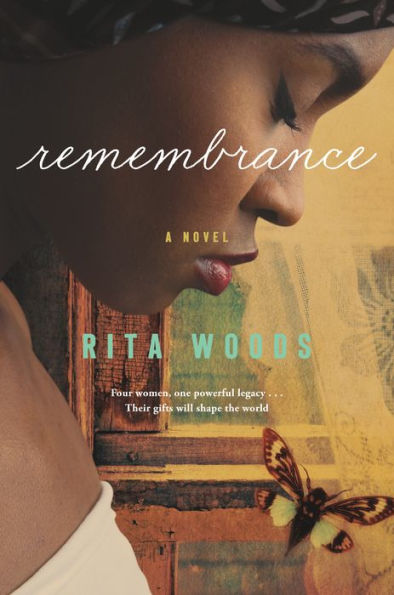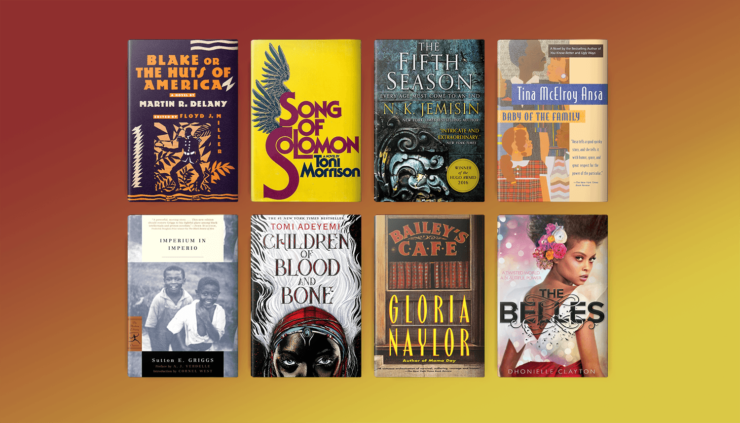In recent years there has been an uptick, if not an actual surge, of the works by fantasy writers of color finally, deservedly, entering the mainstream. These stories are as broad and wide sweeping as the culture itself. From The Belles by Dhonielle Clayton and Children of Blood and Bone by Tomi Adeyemi, to N.K. Jemison’s The Fifth Season. Beautiful novels with intricate, fully imagined, complicated characters and worlds.
But, our voices have always been here, in the background, creating stories. Martin Delany, the first African American to attend Harvard Medical school, is credited with writing what is considered the first book of fantasy by a person of color: Blake or the Huts of America in 1857, the story of an escaped slave who travels throughout the Americas, and Cuba in a quest to unite all Blacks against slavery. Imperium in Imperio in 1899 by Sutton Griggs tells the story of two men involved in a secret organization dedicated to eliminating injustice and creating an independent black state inside of Texas. Even the famed civil rights activist, author, and historian W.E.B. Du Bois wrote a piece of science fiction called The Comet, about a post-apocalyptic New York, where the only survivors, and hope for the human race, are a working class black man and a wealthy white woman.
Well into the twentieth century, the stories of Samuel Delany, Octavia Butler, and Nalo Hopkinson stretched our imaginations, creating new worlds, new futures; re-imagining the past. But, in some large way, these stories remained confined to a small corner of public consciousness, a niche market with occasional exceptions.
I found my reader’s home in a niche within that niche. I was, and still am, drawn to magical/fantastical stories, but stories, as J. California Cooper stated, that were about ‘just everyday people trying to live every day’.
In the stories of Toni Morrison, Gloria Naylor and Tina McElroy Ansa, I recognized life as I knew it growing up: the smell of Royal Crown hair grease and a hot comb smoking on the stove on Saturday nights, vaseline slathered on ashy knees, black eyed peas for good luck on New Year’s Day.
They wrote about life as I lived it every day.
Except…
…there was magic.
In Gloria Naylor’s Bailey’s Cafe, the magic is in the place: Bailey’s Cafe, filled with damaged people who’ve been badly used by a harsh, inhospitable world. There’s a pawnshop that never opens and a boarding house where one can stay by invitation only. The mystery, the magic, is how all these broken people find their way to each other and to something like wholeness.
Buy the Book


Remembrance
Lena is the main character in Tina McElroy Ansa’s Baby of the Family. Born with a caul on her face, she is linked both to the ancestors of the spirit world and to the future. Black, upper middleclass and socially awkward, she’s just trying to live her everyday life, even as she speaks to the ancestors and foresees the future.
In The Song of Solomon, Toni Morrison gives us the story of Milkman Dead, the richest black man in town, who’s family is haunted by murder and greed, and whose life is touched by the Seven Days, a secret society sworn to avenge the unpunished murder of black people.
These stories resonated deeply with me and I returned to them again and again, even as I realized on some level that they were unknown to a large part of the reading world.
I don’t know the reason that our stories are finally being heard, moving from their half lit corners into the brighter light. The success of Blank Panther? Some mysterious critical mass having finally been achieved? The growth of social media? I don’t have the answer to that question.
What I do know is that the world can only seem bigger and more magical when the history and perspective of diverse writers is included. And I know that my TBR pile grows bigger by the day, richly seasoned by a broader culture and historical perspective.
Rita Woods is a family doctor and the director of a wellness center. When she’s not busy working or writing Dr. Woods spends time with her family or at the Homer Glen library where she served on the board for ten years. Remembrance is her first novel.











This goes to show that there were even more pioneers of Black writers of speculative fiction than we thought!
One of my favorite things about attending a big sff con every year is seeing it get more and more diverse. I asked a friend who was self-publishing a sf/romance novel about her history reading sf as a kid. She said she had to hide it from her uncle who would hit her and tear them up and scream “that trash is for white folks!” So glad she went on despite that kind of thing to not only keep reading, but to write in the genre we love.
It was my father who seeded my interest in SF&F. He talked about reading pulps as a kid and hiding them from his mother but we never talked about where his interest came from. He grew up poor and Black living in the south and I can only guess that he would grab at any dream of escaping. He’s gone now but I can count my blessings that he achieved many of his dreams.
Watching the Star Trek DS9 episode “Far Beyond the Stars” was an eye opener because that episode is set in my father’s time.
Thank you for this article! I’ll be adding Remembrance to my TBR immediately. I recently discovered a “Crash Course in the History of Black Science Fiction” by Nisi Shawl that opened my eyes to the history of the struggle for authors of color to break into SF. I love finding new perspectives that break out of the classic mold of SF/F. Nisi’s list dropped a load of books on my TBR while delivering a priceless education in the history of SF.
All of the above books were given to me by my aunt in law, who happens to be a retired African American Literature professor. I was a teen trying to find my genre and was leaning towards sci-fi/fantasy and speculative fiction. Little did I know what reading those books would spark in me! It’s great having representation in the genre and now I have new books to add to my TBR.
I read almost all of Octavia Butler’s books before realising she was black. Loved every book and would prowl through my second hand book caves looking for them. After finding out she was black, a few story lines made more sense to me but I didn’t change what I thought of them, beautiful scifi up there at the top.
Lovely article, with some new books to check out. But you’ve misspelled Samuel Delany’s last name. He spells it the same as Martin Delany, with no e before the y.
@7: Fixed, thank you!
Why Ms. Woods? Probably a combination of all the factors you listed, unimagined others and an insatiable desire for more scifi/fantasy by a more youthful readership. Whatever the reasons, I’m glad. I’m a 65 yr old white guy raised in the South and am sorry I won’t be around to witness the ‘browning’ of the world. I recall reading and not sure how long ago, that the majority humanity will eventually be brown. As in skin tone of course. What will the racists do then? That time can’t come soon enough. I do hope the world becomes a kinder place to all before those days finally arrive.